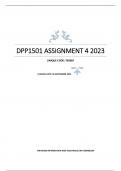DPP1501 ASSIGNMENT 4 2023
UNIQUE CODE: 765965
CLOSING DATE: 06 SEPTEMBER 2023
FOR MORE INFORMATION AND ASSISTANCE DM O760488130
, DPP1501 ASSIGNMENT 4
QUESTION 1
1.1 Explain the ethos of inclusivity (culture of inclusive education) and its implications for the
education system with reference to the following.
1.1.1 Collaboration and support
1. Support for diversity
Inclusive education recognizes and celebrate diversity in all its forms.
This includes recognizing and addressing issues related to social justice, equity and
inclusion, and ensuring that all students feel valued and respected.
2. Support for student with additional needs
This support may include specialised instruction, assistive technology or other
accommodations that enable students to participate fully in the learning experience.
3. Support social and emotional well-being
Educators work collaboratively to create a safe and supportive learning environment
that encourages students to build positive relationships with their peers.
4. Collaboration among students
In an inclusive environment ,students are encouraged to work together in pursuit of
their educational goal.
This collaborative approach fosters mutual respect, acceptance, and understanding,
and helps to build a sense of community within the classroom.
5. Collaboration among educators
In an inclusive education system, teachers collaborate to identify and address.
1.1.2 Teacher training and continuous professional development (CPD)
The ethos of inclusivity in education refers to creating an educational environment that values
And respects the diversity of student, ensuring that all learners have equal opportunities to
Succeed. This approach recognizes and embraces individual differences including but not limited
Race, ethnicity, gender, socioeconomic status, disability and language proficiency.
1. Pedagogical strategies: Teacher need to be equipped with a range of pedagogical
strategies that cater to diverse learning needs. Teacher training and CPD should provide
opportunities for teachers to learn and practice these strategies.
2. Collaboration and partnership: inclusive education requires collaboration and partnership
among teachers, parents, and other stakeholders. Teacher training CPD should emphasize
the importance of building positive relationships with families, involving them in decision
making processes, and seeking their input in supporting students diverse needs.
3. Awareness and understanding: Teacher training and CPD programs should focus on
developing teacher’s awareness and understanding of diversity and inclusion. This includes
recognizing and challenging privilege and power dynamics, and promoting cultural
responsiveness.
4. Creating inclusive classroom environments: This may involve promoting positive
behaviour management techniques, creating safe spaces for dialogue, and addressing issues




